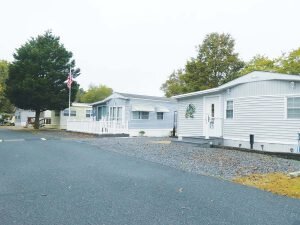By Elizabeth Bonin, Staff Writer
(Jan. 23, 2020) The White Horse Park Community Association Inc. is pushing back against the lawsuit filed by six residents, who allege that Worcester County’s zoning code unfairly makes it illegal for them to occupy their homes year-round.
James W. Almand, White Horse Park Community Association Inc.’s attorney, filed a motion to intervene in the case on the association’s behalf on Dec. 16 in Worcester County Circuit Court.

Submitted Photo
The White Horse Park Community Association Inc. will now be a party in the case between the fulltime park residents and Worcester County
About 55 owners or renters of park units have been fighting to remain in the park full-time, though the park’s zoning stipulates that from Sept. 30 to April 1, they can only occupy the unit for 30 consecutive days or an aggregate of 60 days. Most of the residents struggle with age, disability or low-income.
In response to a warning of zoning enforcement from the Worcester County Commissioners in October, attorney Hugh Cropper, who has represented the full-time residents, filed an appeal with the Worcester County Board of Zoning Appeals.
The Department of Review and Permitting rejected the appeal on the basis that the county only said there could be fines and that it is the county who enforces the residency, not the department of review and permitting.
According to full-time resident Susan Naplachowski, no residents have received fines yet.
Cropper then filed suit in Worcester County Circuit Court in November. Two days later, he filed a request with the court for a declaratory judgment and injunction halting any action against the residents. If the circuit court overturns the decision, the case would go to the county board of zoning appeals.
In a letter from Almand to the White Horse Park Community Association, he responded to what he claimed were “misleading letters” including a Dec. 30 letter from Naplachowski. In the letter, Almand clarified that he recommended the intervention to the board of directors and that “contrary to the assertions of Ms. Naplachowski and other advocates for year-round residency in the park, the pending lawsuit is not limited to ‘the elderly, handicapped, fixed income residents living year-round in the park.’”
“In addition to the county law prohibiting year-round occupancy in the park, the recorded declaration that established the park prohibits year-round occupancy, and the board has the fiduciary obligation to enforce that declaration, even if previous boards may have failed to do so,” the letter reads. “Therefore, in my opinion, the park should be a party in the pending case so that its voice can be heard.”
He emphasized that if the plaintiffs are successful, any person could live at the park year-round. In addition, his legal services are costing each White Horse Park unit owner about $25 to $30, which he said is a small price to pay for the tens of millions of dollars that they could have to pay in order to upgrade the park infrastructure to a full-time capacity.
Cropper said that the motion to intervene was accepted, meaning that the association will now be a party to the lawsuit.
“They filed a declaratory judgement complaint against my clients, the year-round residents,” Cropper said. “I will be filing, in the next day or two, an amended complaint from my original filing, asking the court to stop the community association from taking any action.”
He said he did not oppose the motion to intervene because if the case against the county were successful, then the association might attempt enforce its restrictions. This could resolve the issue all at once.
Naplachowski said the letter she sent out was a survey to all park homeowners asking if they wanted to pay for a lawyer to fight the full-time residents or to let the county fight them.
“If they wanted to get involved, they should’ve gotten involved in the very beginning,” Naplachowski said.
According to Naplachowski, Almand’s statement that anyone could live at the park full-time if they win is not what the residents asked for.
“It said that we’re asking that somehow everybody would have a chance to be full time,” Naplachowski said. “We’re just asking for the people who had been here since June 2018 to reside there full time.”
She added that the board of directors designated the full-time residents as no longer in good standing, so they can no longer attend meetings or vote. Naplachowski said she will have the results of the survey in by Feb. 12.
